Ottessa Moshfegh: Just one shot
by Mark Reynolds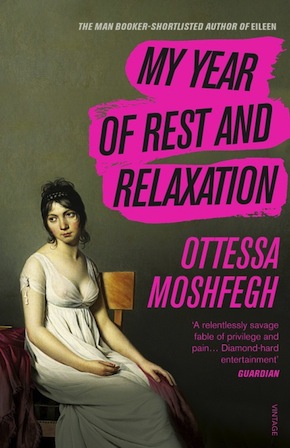
“Whip-smart, continuously compelling, and acerbic in all the right ways.” Daily Telegraph
Ottessa Moshfegh’s My Year of Rest and Relaxation, a New York Times bestseller shortlisted for the 2019 Wellcome Book Prize, is a darkly hilarious novel about narcotic hibernation and moneyed oblivion. The unnamed narrator is a recent graduate from New York’s Columbia University who has given up her underpaid job as a slacker assistant at a pretentious art gallery and withdrawn from the world. Buoyed by a sizeable inheritance from her recently deceased parents, and with the erratic support of her bulimic friend Reva, she locks herself away in the darkness of her generously appointed Upper East Side apartment, emerging only to score an alarming cocktail of uppers, downers and everything-in-betweeners from a malleable psychiatrist who should have been struck off long ago.
I was plagued with misery, anxiety, a wish to escape the prison of my mind and body. Dr Tuttle confirmed that this was nothing unusual. She was not a good doctor…
Like in her previous novel Eileen, the protagonist is a woman in her early 20s who is still trying to work out her own identity and place in the world. “I think 24 is maybe a year where you inviduate more as an adult but you’re also still a kid,” Moshfegh reflects.
Addiction and body image are recurring themes in both books, and across much of her fiction. “They’re concepts that interest me about people,” she says, “and they’ve been prevalent concepts in my own life and in people that I’ve known. I think they both have to do with self-perception and consciousness, and submitting to the reality of who you are. You have one body and one life to live and you only get this one shot – and that reality can drive you crazy.”
I thought a lot about the way that the media presents information, especially when it’s this kind of catastrophic event that has major emotional implications for the entire country, and the way that we process it in a mediated way.”
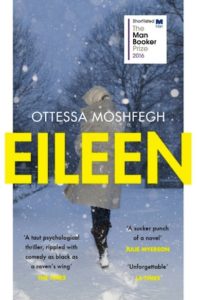 Although My Year of Rest and Relaxation is set almost twenty years ago, before smartphones and social media took over our lives, it does speak a present where we’re overloaded with rolling news and not always capable of processing it. The main character, even through her self-inflicted fug, is at least dimly aware of events in the world outside via overheard TV broadcasts – “floods in India, an earthquake in Guatemala, another blizzard approaching the northeastern United States, fires burning down million-dollar homes in Southern California, ‘but sunny skies in our nation’s capital today as Yasser Arafat visits the White House for talks with President Clinton… ’ ” – and there’s a moment where Reva is struck by a memory of the thousands who lost their lives in the San Francisco earthquake of 1989. (It was certainly a disaster, but the actual death toll was 67.)
Although My Year of Rest and Relaxation is set almost twenty years ago, before smartphones and social media took over our lives, it does speak a present where we’re overloaded with rolling news and not always capable of processing it. The main character, even through her self-inflicted fug, is at least dimly aware of events in the world outside via overheard TV broadcasts – “floods in India, an earthquake in Guatemala, another blizzard approaching the northeastern United States, fires burning down million-dollar homes in Southern California, ‘but sunny skies in our nation’s capital today as Yasser Arafat visits the White House for talks with President Clinton… ’ ” – and there’s a moment where Reva is struck by a memory of the thousands who lost their lives in the San Francisco earthquake of 1989. (It was certainly a disaster, but the actual death toll was 67.)
“I’d forgotten about that San Francisco thing,” says Moshfegh. “Maybe I included that because that was my misperception, and then when I looked it up it was actually not that many people who died, but I remember it as a huge catastrophe. Of course it’s no secret that the book takes place in the year 2000, leading up to September 11, 2001. Once I understood that that was the timeframe for the book I thought a lot about the way that the media presents information, especially when it’s this kind of catastrophic event that has major emotional implications for the entire country, the way that we are fed information and the way that we process it in a mediated way.”
Misfits are another recurring motif in her work, which draws in part on her experiences growing up in Boston, and living in different cities from China to New York. “I don’t think I always felt like a misfit,” she elucidates, “but every place that I’ve lived I’ve felt weird. I just think it’s weird to be a person. I don’t know anyone who doesn’t feel weird, who really instinctually understands how to behave in society. But I think I felt the weirdest as a kid. I didn’t feel like I had that much in common with my peers. I’m first-generation American, I didn’t have grandparents or a sense of belonging in the United States that most of my classmates did. And also my parents were musicians, they weren’t doctors and lawyers like the other parents at my suburban elementary school.”
The music around her was attraction from an early age, and inspired her wider explorations in creativity. “I don’t think I was ever going to become a pianist. I knew that. But piano was like an artistic investment that was really important, and I think that that investment transferred into my writing when I left piano. I was thirteen or fourteen when I knew I was a writer, and I was pretty dedicated from the beginning, to study my own instincts as a writer and get better, develop more.”
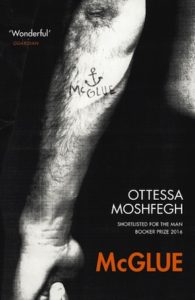 Short stories became her training ground from her early teens. “I was really a short-story writer until I wrote Eileen. Even with McGlue, which is really a very short novel, I still regarded myself as a short-story writer.” It was during an MFA at Brown that she began to expand into longer fiction. “I was in graduate school for only two years, and they were very productive,” she says, “and the main project I came up with was McGlue. I knew that this was a special time, that I should not squander it by just experimenting with different things but actually dedicate myself to a certain project. And then when I found McGlue, it was like, OK, I want to do this during my time here. I found a really brief article about this man named McGlue, who had just been acquitted on a count of murder. It was from a newspaper from 1851 in New England, and it included some of the details of what would later become my book.”
Short stories became her training ground from her early teens. “I was really a short-story writer until I wrote Eileen. Even with McGlue, which is really a very short novel, I still regarded myself as a short-story writer.” It was during an MFA at Brown that she began to expand into longer fiction. “I was in graduate school for only two years, and they were very productive,” she says, “and the main project I came up with was McGlue. I knew that this was a special time, that I should not squander it by just experimenting with different things but actually dedicate myself to a certain project. And then when I found McGlue, it was like, OK, I want to do this during my time here. I found a really brief article about this man named McGlue, who had just been acquitted on a count of murder. It was from a newspaper from 1851 in New England, and it included some of the details of what would later become my book.”
The thing about thinking is that you can think yourself into any conclusion. Not that instincts can’t change, but they’re usually pretty clear, even if the instinct is to hesitate.”
The narrator in My Year of Rest and Relaxation reacts to the glitter and glamour of pre-9/11 New York by shutting down because all around her she sees only artificiality and delusion. But that was not Moshfegh’s own experience of that time. “I only became disillusioned with the city after I left it, seeing it objectively,” she affirms. “Because New York is so enchanting, when you’re there it feels like you’re in the centre of the universe. But I don’t feel so much like my character does. I think there’s a lot of value in things outside of myself, whereas my character has convinced herself that there’s really nothing for her in the world. I don’t feel that way. But New York is a really exhausting city.”
There’s an echo of Ivan Goncharov’s Oblomov and Herman Melville’s Bartleby about her character’s resistance to drudgery, and Moshfegh has acknowledged that reading Charles Bukowski was strong influence in terms of opening up how she wanted to write. “I don’t know if I ever read instructionally,” she says, “but Bukowski was great because his novels were the first books where I actually laughed out loud. I’ve always been a big fan of comedy. I grew up a huge fan of stand-up comedy and really love the monologue narrative form, which is I think part of why I write so much in the first person, because it’s just like one long stand-up routine. So a lot of things influence me, not just books.”
Dr Tuttle is a monstrously funny creation, doling out dubious off-the-cuff advice and observations along with her random prescriptions. When she declares, “If it’s suicide, I can give you something for that,” it’s not immediately clear whether the proposed dose would be preventative or lethal. And there’s very little reassurance when she states, “There’s no way to know how these medications will affect you” as she signs off the latest batch of pills. But there is irresistible logic in her comment that “people would be so much more at ease if they acted on impulse rather than reason. That’s why drugs are so effective in curing mental illness – because they impair our judgment. Don’t try to think too much.”
“I think it’s good advice for artists, and for hyper-educated people,” insists Moshfegh. “You pass a certain threshold where you have so much philosophy in your head that you don’t know what you actually believe any more. I see that happening a lot in very literary people. I also see a lot of self-censorship, opinion now is way more political than it is personal, even if it’s an opinion about, I don’t know, whether something tastes good, there’s too much to take into account to please everybody. So yeah, I do think that’s pretty good advice. I mean, the thing about thinking is that you can think yourself into any conclusion. Not that instincts can’t change, but they’re usually pretty clear, even if the instinct is to hesitate.”
What I was looking to say in each of the stories was the impossible and heartbreaking reality of having a life that is going to be over and having to say goodbye to something you won’t even remember.”
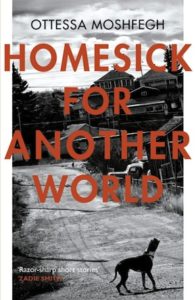 Her story collection Homesick for Another World is Moshfegh’s most personal work to date, and when it came out she said she was done with short-form fiction. “I don’t really have a short story in me,” she says. “I’ve written a couple of things, but it’s not where the fire is for me right now. I just started working on a new novel and it feels like that’s what I should be doing. There was something really heartbreaking about finishing the collection. Writing another short story doesn’t feel right. What I was looking to say in each of the stories, I did say in the last story as succinctly as I possibly could, and that was the impossible and heartbreaking reality of having a life that is going to be over and having to say goodbye to something you won’t even remember, just that moment. It’s also a story about my brother. I was very close with my younger brother when I was a kid, and sharing this negotiation of what it means to be on planet earth. And when I finished the story it felt like goodbye to this chapter of my life and goodbye to this question. And my brother has since passed away, so that story has a very powerful resonance for me more and more. Because he left the planet, and now I’m left here I don’t really want to go back and visit that. There’s something about the short story form that is far more existential in my ambitions about it. A novel I feel is so luxurious, I can really live in a novel, but in a short story the brevity is devastating.”
Her story collection Homesick for Another World is Moshfegh’s most personal work to date, and when it came out she said she was done with short-form fiction. “I don’t really have a short story in me,” she says. “I’ve written a couple of things, but it’s not where the fire is for me right now. I just started working on a new novel and it feels like that’s what I should be doing. There was something really heartbreaking about finishing the collection. Writing another short story doesn’t feel right. What I was looking to say in each of the stories, I did say in the last story as succinctly as I possibly could, and that was the impossible and heartbreaking reality of having a life that is going to be over and having to say goodbye to something you won’t even remember, just that moment. It’s also a story about my brother. I was very close with my younger brother when I was a kid, and sharing this negotiation of what it means to be on planet earth. And when I finished the story it felt like goodbye to this chapter of my life and goodbye to this question. And my brother has since passed away, so that story has a very powerful resonance for me more and more. Because he left the planet, and now I’m left here I don’t really want to go back and visit that. There’s something about the short story form that is far more existential in my ambitions about it. A novel I feel is so luxurious, I can really live in a novel, but in a short story the brevity is devastating.”
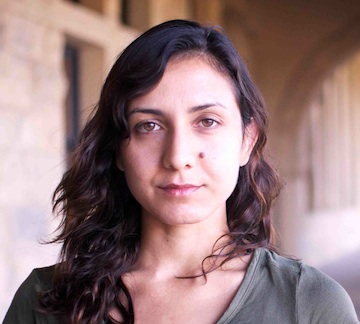 Ottessa Moshfegh was born in Boston to a Croatian mother and Iranian father. She was awarded the Plimpton Prize for her stories in The Paris Review and granted a creative writing fellowship from the National Endowment for the Arts. Her previous books are the novella McGlue, the novel Eileen (winner of the 2016 Pen/Hemingway Award and shortlisted for the Man Booker Prize) and the story collection Homesick for Another World. My Year of Rest and Relaxation is out now in Vintage paperback, RRP £8.99, and also available as an eBook or audio download from Vintage Digital.
Ottessa Moshfegh was born in Boston to a Croatian mother and Iranian father. She was awarded the Plimpton Prize for her stories in The Paris Review and granted a creative writing fellowship from the National Endowment for the Arts. Her previous books are the novella McGlue, the novel Eileen (winner of the 2016 Pen/Hemingway Award and shortlisted for the Man Booker Prize) and the story collection Homesick for Another World. My Year of Rest and Relaxation is out now in Vintage paperback, RRP £8.99, and also available as an eBook or audio download from Vintage Digital.
Read more
@vintagebooks
Author portrait © Krystal Griffiths
Mark Reynolds is a freelance editor and writer and a founding editor of Bookanista
@bookanista

